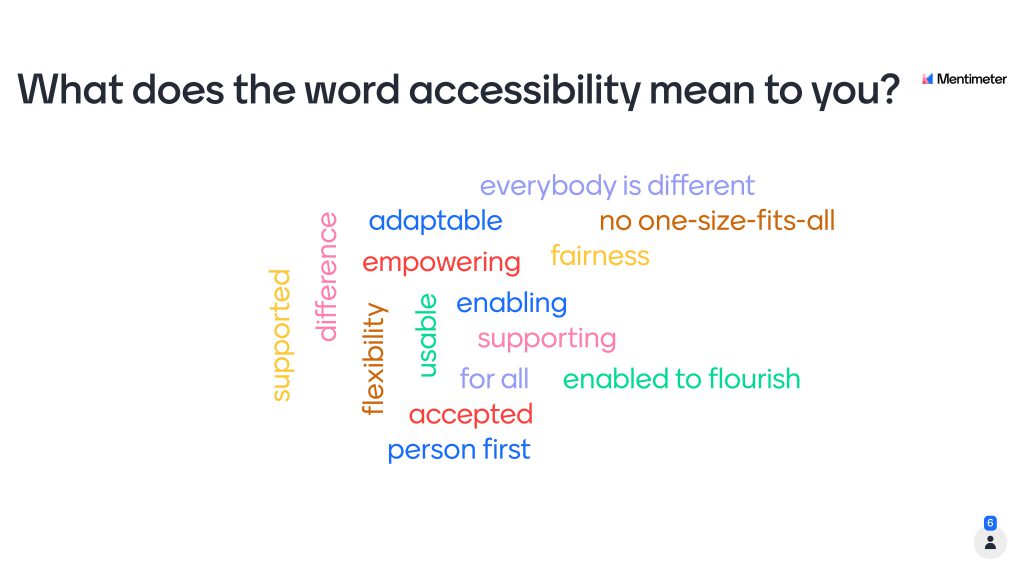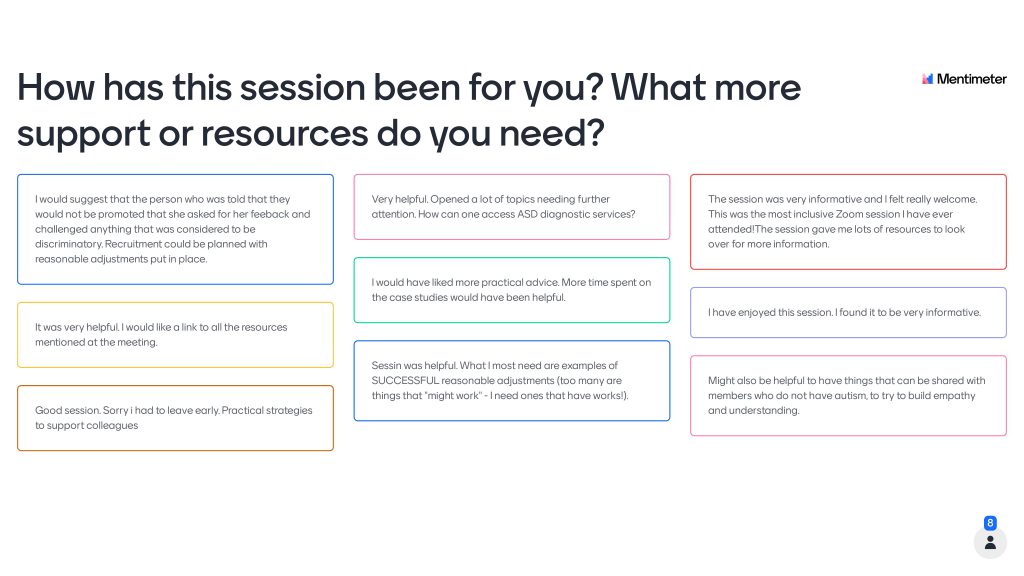See you on the internet?
Though many meetings are now again taking place in person, there is much to be learnt from the shift to meeting online during the pandemic.
Effective online meetings can enable more people to participate and can be helpful spaces for gathering anonymous data. And the learning from our time online can be integrated into in-person meetings, too!
For many disabled, and neurodivergent workers, online meetings can be more accessible, and this is often also the case for parents and carers, and people who live further afield.
In this learning, we will consider learning from online meetings and look at some examples of the types of information that can be gathered using MentiMeter. You can create your own MentiMeter account and create a draft presentation related to the topic of Autism Appropriate Workplaces.

Before the pandemic, when surveyed about whether meetings of disabled EIS members would be of interest, members’ responses overwhelmingly rejected this. The reasons given were travel, time, and feeling exhausted already by every day demands.
During the pandemic however, the move to online meetings has enabled disabled EIS members to organise as never before. The EIS Disabled Members Network was established in 2021 and the EIS’ work on disability equality and related issues, has grown.
Meeting online has in some ways levelled the playing field in terms of meeting participation, giving more options for participants to contribute effectively. Hand-raising and turn-taking is more commonplace online, Q&A boxes now sends questions instantly, and the chat function can allow us to respond to something in real time without having to speak.

Reflective question
Consider what the pros and cons are of meeting online – are they the same for everyone? Who may benefit more from an in-person meeting? Who might benefit less?
Accessibility of online meetings, for autistic people
Meeting online may offer several benefits and could possibly facilitate more active contribution from neurodivergent members, including autistic people. Meeting online simply reduces the need to exert energy related to travel, engaging in small-talk etc. and usually provides a clear structure.
Online meetings platforms have given thought to options for how people best participate. Thess could reduce the impact of those who are quicker to speak, dominating the content of the meeting, and can make participation more equal. There are usually a number of ways you can contribute to an online meeting.
This is not to say that all online meetings are automatically more accessible, nor that all autistic people prefer online meetings! There are many steps that should be taken to ensure meetings are accessible, but the option to meet online should be part of our toolbox.
Reflective question
When planning a meeting, are there any accessibility considerations you would like to make in terms of how the meeting is structured? What tools and mechanisms of online meetings would be useful to implement at in-person meetings?
Sensitive data collection
Though online platforms such as MentiMeter allows us to gather data anonymously, we should still take care to frame our questions sensitively. Reflect on how the responses may be perceived, especially if they are hugely divergent, or a small minority shares an experience missed by the majority – this can exacerbate feelings of isolation.
You should also be clear with participants about the purpose of asking these questions, and what will be done with the results.
Furthermore, participants may need to be reminded not to include identifiable details in their responses. You may want to make sure you are only screen-sharing the MentiMeter findings at meetings, after having reviewed the responses.
Online meetings should be password protected.
Reflective question
Think about what questions you would like to ask participants in your meeting, related to autism appropriate workplace. Consider possible findings – how might the sharing of these be experienced differently by autistic people and non-autistic people?
View our archived material on Fair-Work within Scotland’s education system